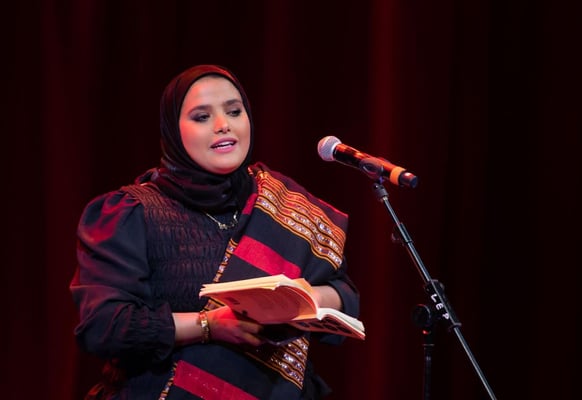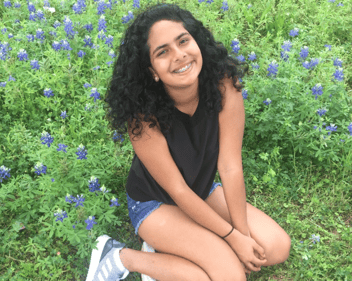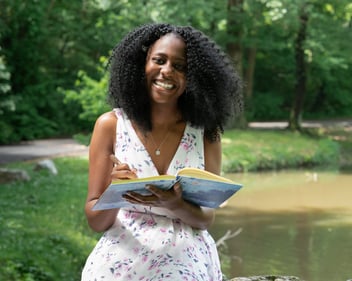Writing poetry starts long before you put your first words on the page; it begins with watching and wondering about the people around you, observing current events, reflecting on the dynamics in your community, and so much more. In other words, asking questions! As our Poetry & Spoken Word Competition Guest Judge Amina Atiq says, “You can teach anyone to write a poem, but to be a poet informs how you observe and reflect on the world around you.”
Below, Amina gives us the inside scoop on how her activism intersects with her poetry, the current project she’s most excited about, and how her dyslexia powers her creative process. Plus, learn what she’s looking for in a winning entry! Read on.

You’re a poet and activist and have also worked on a number of interesting community and cultural development projects. What has your path to these careers looked like, and how do they intersect with and inform one another?
I was always asking questions from a very young age, and being both a poet and activist is about asking “why do people behave in this way?” I started writing at age 12, but I started to write with purpose when I was 15. You can teach anyone to write a poem, but to be a poet informs how you observe and reflect on the world around you. When I was starting out, I used to pick up this free local newspaper on the bus. It was from reading this paper every morning that I became aware of a lot of social injustices happening in my community, and I would find passion and purpose when writing poetry. I don’t think I can separate my activism from my poetry—they are inextricably linked!
What are you currently working on?
I’m a freelance creative, which means I am self employed—I get to work on different projects at the same time which is exciting, but It can sometimes feel unstable too. One of my highlights has been the project I’m doing with 20 Stories High. In my city of Liverpool there was a terrorist attack outside the women’s hospital, in a very diverse community with a significant Muslim population. After the attack, there was a rise in Islamophobia and anti-Muslim hate. I’m visibly a Muslim woman, and statistics show you are more likely to be targeted as such—I felt fearful and sad and angry and frustrated. When I met with 20 Stories High, they asked me how I was feeling—no one else had really asked me that—and this question formed the basis of a project. We worked with Muslim young people in workshops, and the work that’s been created will be turned into a poem on a public bus. It celebrates the Muslim community and will be seen and read by so many people. It’s been an honour working with young people who are using their pen for the first time. All you need to write poetry is to be curious.
What dream project do you hope to tackle in the future?
My dream is to have a collection of my poems published. I was a spoken word performer before I started writing page poetry. I had to relearn the foundations of poetry when I went to university, and then I was diagnosed with dyslexia, which really hindered my confidence. Because of this, I’ve had to approach poetry in a very creative way. For example, one of my processes is to create visual mood boards. To be able to say “I’m dyslexic, I’m a poet and I’m publishing my first collection” would inspire other young writers with dyslexia and other learning difficulties. I want to put some of the drafts, visual thinking, and mood boards in the final work to demonstrate that process and help to make writing more accessible.
What are you looking for in a winning poem? A winning spoken word performance?
One of my teachers used to say that a poem should be able to “sit alone on the page” and I think that is so important. The same goes for spoken word too: a poem is successful when it can literally “sit on its own” on the stage. As spoken word performers, we don’t have lights or stage managers—there is really just us and the poem up there. For both forms, it’s important that the poem can tell a story—can you move me with words sitting on the page? For spoken word, how do you tell the story through the use of your voice, how do you take the listener through that journey?
I’m also looking for a unique voice. Can I hear the voice of the writer, and is the voice consistent? When I started to write, I started to imitate other voices, but then I forgot my own voice! It takes courage and bravery to share words that are important to you—I’m looking for unique, brave and courageous voices!





